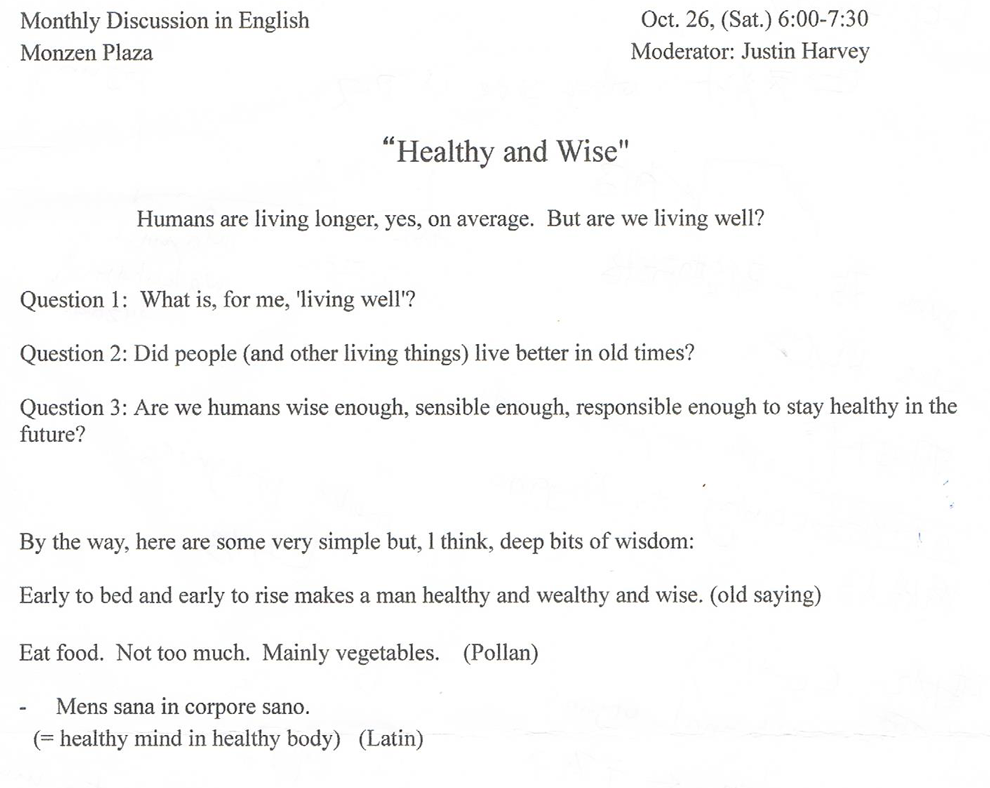英語で討論会「Monthly Discussion in English」今日のテーマは「健康を保つ秘訣」

1. 参考にした文献
読み進めている「The Willpower Wisdom of Dr. Kelly Mcgonigal」という本の中に、脳の働きを高めるための、心と体のケアに関する項目があったので、以下に引用します。
Some of the best ways to enhance [ɪnhˈæns / 高める] willpower are the things that really take good care of your brain and body. For example, getting more sleep, exercising regularly, meditation, even what you eat can increase your willpower.
If you are able to eat things that keep your blood-sugar level steady – things that are basically healthier foods, not junk foos – that seems to actually increase our wilpower.
I actually recommend that people do something that they love, because if you tell people to exercise and they don’t already, sometimes they’re going to then (このthen 意味不明? ) have to use all their willpower to do it. / ~ 運動しなさいと言っても、その人が普段運動しない人なら、場合によっては、運動するために自分の意志力を全部使う羽目になりますから。
So, my suggestion is, if there’s a anything that you actually like doing like gardening or walking or dancing or sports. There’s no benefit to doing something you hate.
And there is some research suggesting that being outdoors can have a similar effect – even just taking a walk around the block. That very short amount of physical exercise in the outdoors – particularly if you can see the sky or you can something green like trees – that seems to enhansce the stress-reducing benefits of exercise.
So rather than having to find the time to work out for an hour, you could just step outdoors a couple of times, maybe before you go to work or once in the afternoon. That may actually be more beneficial than trying to do some very athletic workout.
Scientist have found that willpower is contagious. Your own hard work and self-control can rub off on your friends.
con・ta・gious / kəntéɪdʒəs 伝染性の
伝染するbe infected with / One is infected with cholera.
in・fect / ɪnfékt 感染させる / His flu infected his wife.
rub [ rˈʌb / こする] off on / (人)に影響を与える
2. 私の主張
Usually , we interpret [in・ter・pret / ɪntˈɚːprɪt 判断する / +目的語+as補語で、…を…の意味と理解する ] physical and mental symtoms as negative effects of health, but we can see them signs that our body needs help.
We need to decide to change our lifestyle not to depend on medicines.
(to不定詞を二つ続けられる?) ( notは不定詞の前にも置ける?)
This idia requires enough will power that resists temptations and distractions.
Sometimes the gap of feeling between where we are today and where we want to be, (=the gap between ideal and reality ) makes stress.
I try to reduce desires and to find happyness in small things such as just taking a walk around the block, taking a bless and to feel delivering more oxygen to my brain and body.
(and で二つのto不定詞を並列することは可能か、あるいはSV構造にしなければならない? ) (動作動詞は動名詞だが、feelのような状態動詞はto不定詞が適当?)
It seems that I’m becomiing a hermit.
(becomeは進行形にできる?)
3. 今日得た表現 (健康に関して)
- A patient showed a symp・tom [sím(p)təm / 症状] of a side effect [副作用]
- Fallout is an aftereffect [後遺症 ] of a nuclear explosion. / 死の灰は核爆発の後遺症である
- in Chinese medical science the five important internal or・gans [ˈɔɚg(ə)n / 内臓] of the human body, namely, the heart, kidneys, lungs, liver and spleen [ splíːn / 脾臓、不機嫌]
- health problem [hélθ prάbləm] dis・eas [ dɪzíz] ほど深刻でない表現に
- a lymph node [ límf nóʊd / リンパ節・リンパ腺]
- gene [dʒíːn / 遺伝子]
- My mother said that recently her men・o・pause [ménəp`ɔːz / 閉経(期)] symptoms have become more heavy.
- I a・void [əvˈɔɪd ] eating (+to doは不可) deep fried food with old oil.
- 「後期高齢者」という難解な日本語もover age 75 で表現できる。
- I was putting 5kg than now.
- We can keep (maintain) natural (normal) blood presure.
- I’m going to the doctor. / 病院に行く
- I have a heart condition / 心臓が悪い. [con・di・tion / kəndíʃən 体調 / my financial condition 私のふところ具合 / housing conditions 住宅事情
- My in・ju・ry [índʒ(ə)ri / 怪我] (=symp・tom / sím(p)təm) is curing [ ˈkjʊrɪŋ] ( =healing ) ⇒ My injury has cured completely.
- Are you on med・i・ca・tion ? [ mèdəkéɪʃən / 薬物治療 (med・i・cine / médəsnは医学、特に内科・内服薬の意 )] / 何か持病がありますか?
- I’m sorry I’m on medication. / 酒の誘いを断るような時に。
- 薬を飲む / I’ll take the medicine. 「誰が何をする」の基本イメージで英文を作ること。そして「薬の成分を取っている」という動作をイメージすること。
4. 今日得た表現 (その他)
- 10月13日、台風19号による千曲川堤防決壊被害が発生したため、 堤防の構造についても話題が及びました。One side of a lev・ee [ lévi / 堤防。あるいは bank / bˈæŋk] is ce・ment [ sɪmént ] , other side is earth.
- make prog・ress [ prάgrəs ] progress はある目標・方向に向かって絶え間なく進んでいく進歩; ad・vance [ədvˈæns] はレベルが高まっていく進歩、自動・他動詞の用法もある; 、de・vel・op・ment [ dɪvéləpmənt ] はあるものが本質的にもっている特質などが高まっていくような進歩
- after coming Nagano / after の前置詞用法。接続詞として使う例/ I’ll wash the dishes after the video is over。副詞として使う例 / [順序を表わして] I’ll go first and you come after. [時を表わして] I reached London after (これは前置詞) 2 days and Jim arrived 3 days after (副詞). 形容詞として使う例 / after ages 後世
- He applied for a job to three colleges / 「申し込む」の意の apply は自動詞